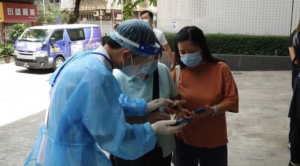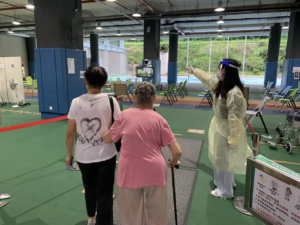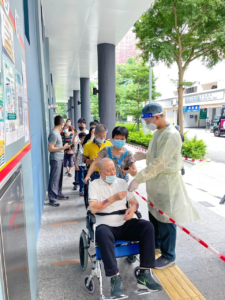Students, faculty members and administrative staff members from the University of Macau (UM) have supported the citywide nucleic acid testing initiated by the Macao Special Administrative Region government. They are motivated to answer the call for frontline volunteers to help prevent and control COVID-19.
The students, faculty members and administrative staff members from UM took on many tasks in the test stations across the city, such as giving instructions, managing appointments, providing logistical support and keeping order. Hui Kwun Nam, an academic staff member at the UM Institute of Applied Physics and Materials Engineering, was one of the volunteers. He registered the details of people waiting for a test, and guided people with a yellow Macao Health Code to special areas for testing in his test station, where he was constantly sweating with his personal protective equipment (PPE). ‘I did feel burdened by the heat wearing my PPE, but I felt it was all worth it when we heard citizens thanking us. A simple “thank you” means a lot.’
Anna Cheang, an academic staff member at the UM Institute of Chinese Medical Sciences, helped with the logistics of a test station in Colégio Mateus Ricci. During her service, Cheang did inventory checking, distributed materials, and made sure the test station had enough supplies. She says that the volunteers looked out for each other and worked together like one big family. ‘We all kept our meal breaks short so that we could get back to work quickly. The logistics team had to walk around in heavy PPE in the heat. We took turns to move the heavy stuff so that the workload was evenly distributed.’ She adds that she finds it amazing to work with other volunteers in the hope of reducing the number of infections in Macao to zero.
Liu Jingjing, an academic staff member at the Shiu Pong College of UM, worked day and night as a volunteer in a special test station in the Seac Pai Van Public School. ‘ In UM’s residential colleges, we encourage students to develop a sense of service to others, so I would like to lead by example. I hope that with all of our efforts, Macao’ll soon overcome the difficult times.’ He adds that he looks forward to the end of the pandemic when normal life returns.
Shirley Wu, a staff member of the Lui Che Woo College of UM, says this is the sixth time she has volunteered for the citywide testing in Macao, and she had participated in all the previous rounds. She says residents have been familiar with the testing, so the test stations were running quite well, making it easier to work on the frontline. In her test station, Wu saw an old woman who did not have a mobile phone to show her appointment details. ‘The woman had neither a mobile phone nor family member to turn to for help. She sat at the entrance and burst into tears. We immediately came to comfort her, and one of us generated a Health Code with a phone for her to enter the station.’ This strong community spirit has inspired her to draw on her experience to encourage more people to support frontline workers, Wu says.
Many UM students also volunteered to work on the frontline in the COVID-19 response. Chong Ka Lam, a student in the Faculty of Law and the Shiu Pong College at UM, has participated in all the previous rounds of the citywide testing. ‘I have derived great satisfaction from volunteering, which is already part of my life. We’re entitled to benefits from the government, but I think as citizens we also have to give back to society.’
Cheong Pui Man, a student in the Faculty of Education and the Choi Kai Yau College at UM, counted the number of people waiting in and outside her test station every 15 minutes. She also posted these numbers on government websites so that people could estimate their waiting time. ‘I walked around quite a bit, which was really tiring, but I was so glad to be able to help others and contribute to society.’
Lei Hio Lok, a student in the Faculty of Business Administration and the Shiu Pong College at UM, has volunteered for the citywide testing for several times. ‘The latest round of the testing ran quite smoothly. With good teamwork and communication, everything went very well. I was delighted and found my work meaningful when I heard our senior citizens thanking me for my service.’
為配合特區政府全民核酸檢測,澳門大學組織老師、行政人員和學生義工協助有關工作。不少澳大人紛紛走上前線,積極投入到全民核檢的志願服務中,為疫情防控出一分力。
期間,澳大老師、行政人員和學生分別到不同的核酸站點幫忙分流、登記、引導、清點和搬運物資等工作,維持核酸站的秩序。澳大應用物理及材料工程研究院老師許冠南主要負責登記資料和帶領黃碼人士到指定區域做核酸檢測。因為穿著防護衣物,每次下班時他全身都會因汗水而濕透,“雖然穿著這身衣服真的很熱,但每一次市民的道謝都讓我內心一暖,短短一句謝謝就已經足夠了。”
澳大中華醫藥研究院老師鄭慧珊被分配在利瑪竇中學負責後勤支援,每天負責清點貨物、搬運物資等,並確保物資充足。最讓她感動的是身邊的義工好像家人一樣,“每一位義工每次休息吃飯時都盡量吃快些,為的就是快點回崗位繼續工作,減輕其他義工的負擔。我們後勤組因為要經常走來走去,防護衣很厚,天氣又很熱,身邊總有其他義工會不定時和我們替換工作,不會特定某個人不停搬物資。”能與其他義工一起同心協力為澳門付出讓她鼓舞,希望澳門能早日清零。
澳大紹邦書院老師劉京京通宵達旦在石排灣公立學校核檢站的關愛站幫忙,他表示,“作為書院的老師,經常跟同學們強調服務精神。自己來做義工,既有身教之意,以身作則,又可積累經驗,知行合一。希望我們所有人的努力可以讓澳門盡快渡過難關。”他希望可以盡快戰勝疫情,回復正常的秩序。
澳大呂志和書院職員胡小敏自疫情開始每一次都會做義工。第6次當全民核檢義工的她坦言市民對核檢方式越來越熟悉,大家秩序良好,減輕不少前線工作人員的負擔。令她印象最深刻的一次是有位老婆婆因爲沒有智能手機而不能進入核檢站,“這位婆婆說自己沒有手機,然後開始哽咽,她說自己除了沒有手機,其實連一位親人也沒有,直接坐在門口大哭起來。這時候義工們都走來安慰婆婆,並用自己的手機幫她生成健康碼,讓婆婆順利進行核檢。”這件事讓她看到人間有情,希望透過自己當義工的經歷啓發更多人主動幫助前線人員。
此外,澳大學生也積極參與抗疫前線工作。澳大法學院、紹邦書院學生鍾嘉嵐作為其中一名義工,每次全民核檢都會義不容辭幫忙。她表示,“做義工成為了我的習慣,也讓我產生滿足感。我覺得市民有權利享有政府提供的各種福利,但同時亦有義務回饋社會。”
UM volunteers help with registering residents waiting for a COVID-19 test
澳大義工協助市民登記
UM volunteers divert people to various lanes
澳大義工幫忙分流人群
UM volunteers help elderly people in a nucleic acid test station
澳大義工在核酸站協助長者




